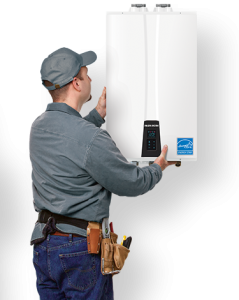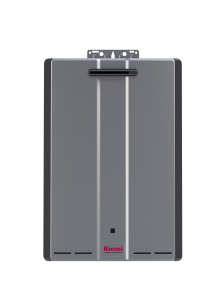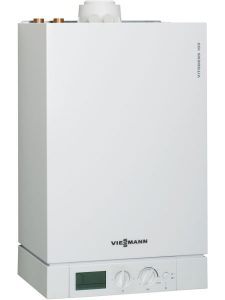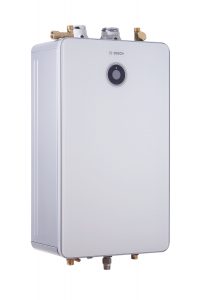Tankless Water Heater Repair and Installation
OnDemand water heaters have become very popular in Greater Vancouver areas lately for several good reasons. Tankless water heater repair is very rare as the units are much more reliable than traditional hot water tank units. Tankless hot water heaters are more energy efficient than traditional units because they heat water as it is used, rather than heating and reheating water in a storage tank. They also take up significantly less physical space, as they do not have a bulky storage tank.
People that have installed tankless water heaters have been very pleased. We install most brands of tankless water heaters including both indoor and outdoor units. Need help deciding which tankless unit is right for you? Call our knowledgeable customer service staff at 604-558-4545.
Tankless water heaters are gaining popularity in the BC for several reasons:
Endless Hot Water
Since tankless heaters warm water on-demand, hot water will not run out. This is especially useful for large families or for homes with large hot water demands – for example, homes with a hot tub or spa system are often good candidates for a tankless system. If you have considered upgrading your tank size from 40- or 50-gallons to 66- or 80-gallons, we strongly recommend a tankless hot water heater.
While traditional hot water tanks are compared based on gallon capacity, recovery rate and first hour rating, tankless hot water heaters are compared based on flow rate. As long as the home uses hot water at a flow rate below the tankless heater’s maximum flow rate, there is no “recovery”. For practical purposes, first hour usage is unlimited.
Flow rate for a tankless water heater is measured in gallons per minute, based on a given heat rise (typically 25 or 50 degrees) and range from 4 gallons per minute to 8 gallons per minute. A unit that heats 4 gallons per minute can handle a shower plus one appliance operating at the same time. A unit heating more than 7 gallons per minute can typically handle two showers and a large appliance.
Important to note: Tankless units do not literally provide instant hot water– the hot water still takes time to flow from the unit to the faucet.
Save Space
The footprint of tankless units is much smaller, freeing up additional space in your home or garage. Tankless units save space because they are wall-mounted and do not utilize a large water storage tank. Some units can be installed on the exterior of your home, so they take up no indoor square footage.
Currently, the most efficient traditional gas water heaters operate at 67% efficiency. Efficiency is a measure of heat transfer from the energy source to your hot water. Tankless heaters operate at greater than 80% efficiency. Tankless units save additional energy because water is not being constantly heated, cooled and reheated within a storage tank. And while efficiency for traditional water heaters will decline as sediment builds up in the tank, a tankless hot water heater maintains its efficiency over time.
Overall, a consumer can save 30-60% in water heating energy costs, assuming their water usage habits do not change. Annual energy costs for heating water in the average home range from $150-400 per year, so there is a significant savings potential.
High Quality/Longer Lasting Product
A standard water heater will usually last 8-12 years. Tankless heaters can perform well for 20-30 years. These water heaters are constructed with top-of-the-line components and materials, and accordingly, are less susceptible to rust and leaks.
With the long lifespan of a tankless water heater, you can expect to recoup higher installation expenses with your annual energy savings, over time.
In some cases, homeowners may be able to recover the cost of a tankless installation as a tankless water heater may increase the overall sale value of your home.
What Size Tankless Unit Should I Purchase?
Currently, most major tankless water heater manufacturers make several sizes of tankless water heater. Unlike traditional tanks, tankless water heater sizes are measured by per minute flow rate rather than by gallon capacity. Typical flow rates for most major brands range from four to eight gallons per minute (or GPM).
In our experience, smaller four to five GPM units are suitable for studio apartments and small one bathroom homes or other application specific needs. For homes with two bathrooms or more, we strongly recommend installing a six to eight GPM unit as these heaters can typically service two or three applications at the same time. For very large homes, there are other options, such as installing multiple tankless units at the same location.
Types of Tankless Water Heaters
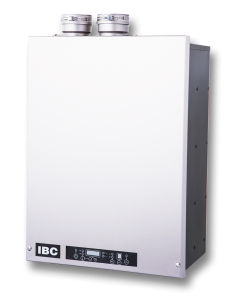 There are three types of tankless hot water heaters available:
There are three types of tankless hot water heaters available:
- Non-condensing: This is the first generation of tankless unit. These units use a heat exchanger to heat your water on-demand, and reach an Efficiency Factor (EF) of .82-.85. This technology has been in use in Europe and Japan for decades and is well-proven. The advantage of this type of unit is in reliability in that they are established products with few manufacturing issues.
Some of the drawbacks of non-condensing units include hot exhaust, which means you have to install (expensive) stainless steel venting, and lower energy efficiency – in particular, the efficiency of these units drop when you use lots of hot water in short draws (i.e. washing your hands).
- Condensing: Condensing units are the second generation of tankless water heaters. After a primary heat exchanger, these units use a second heat exchanger, which reuses the heat from your exhaust to further heat the water. This results in an increased efficiency of 92-94%. The benefit of cooler exhaust is that these units can be vented using (inexpensive) PVC, while the drawbacks included a higher unit cost and, similar to non-condensing units, a lower efficiency for short water draws.
- Condensing hybrid: Condensing hybrid units are the third generation of tankless water heaters and were pioneered in the United States. These heaters incorporate a small – between 1 liter and 2-gallon – holding tank. This small holding tank keeps a reservoir of hot water, eliminating lower efficiency for short draws, meaning these water heaters achieve a true EF of .92-.96. A recent study by the Gas Technology Institute measured real life efficiency of condensing hybrid tankless water heaters and found the units consistently operated at 94% efficiency with little to no degradation due to short draws.
These units can also be vented in PVC which is less expensive. In some cases, the units also addressed “cold water sandwich” issues and pressure fluctuations that sometimes occurred with first and second generation models. There may also be slightly less lag in the time it takes to deliver hot water to the tap or appliance. One of the drawbacks (as of writing) of this technology is that because it’s newer, most models are manufactured by smaller companies. In some cases, there have been manufacturing-quality and warranty issues with these units. Product reliability is improving but it’s important to be careful about the brand you purchase.
How much will it cost to install a tankless water heater?
Cost to install a tankless unit varies greatly. We usually must perform an estimate in order to determine total cost. However, total cost generally ranges from $3500-$5000 installed.
In order to install the unit properly, your home must have gas or propane and we must typically:
- Run a dedicated gas line to the unit because tankless heaters require up to 200,000 BTUs at full fire.
- Install category-3 stainless steel or PVC venting. This may require us to relocate the heater to an exterior wall or outdoors.
- Install additional piping if we need to relocate the heater.
- Run dedicated power to the tankless heater. Please note in the event of a power outage, the unit will not provide hot water. However, we can install a backup battery system.
If you are replacing an existing tankless water heater or if your home is newly constructed and set up for a tankless unit, cost of installation drops significantly!
Tankless Water Heater Brands
Navien Tankless Water Heater Repair
Rinnai Tankless Water Heater Repair
Viessmann Tankless Water Heater Repair
Bosch Tankless Water Heater Repair
IBC Tankless Water Heater Repair
Give us a call, or fill out the form here to speak to an Installation Coordinator about commercial water heater work.
